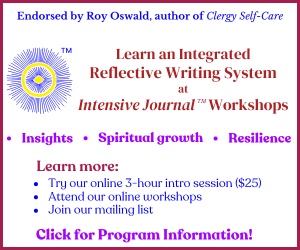Spiritual Formation during the Coronavirus Pandemic
When the test result came back positive a few weeks before Thanksgiving, I couldn’t believe my eyes. I’d followed all the recommendations – two vaccine shots, physical distancing, mask-wearing, handwashing – yet still, I was infected with the COVID-19 virus. Thankfully, the symptoms were mild, but for the following 10 days, I self-quarantined, which meant staying in my home office, eating by myself, and distancing from my wife and family.
The experience was terrible. It was not so much the illness itself – I could deal with the flu-like symptoms – but I was troubled by the sense of “uncleanliness,” and that a passerby could “catch” my disease. It was also impossible not to feel fear and ponder the worst-case scenario. Instead of imagining a future with our grandchildren, I was left to wonder – are my affairs in order?
During this period of uncertainty, I drew on my resources, namely, the thousands of hours visiting patients, families and staff at hospitals, and more recently, my experience teaching “Spiritual Formation and Integration.” Though there are many ways to understand spiritual formation, I resonate with Christian scholar Dallas Willard (1935-2013), who believed that people of all faiths go through spiritual formation. He used the metaphor of flying to demonstrate its meaning: “One of the things I most like about flying is when you take off through the clouds and finally break through them into the sunlight.… It is so thrilling to break into the sunlight.” I appreciate this colorful image of breaking through the clouds and into the sunlight as a way to describe spiritual growth. “Very likely we will not become perfect for some time yet,” he said, “but we can, as Paul urged the Philippians to do, ‘become blameless and innocent, children of God above reproach in the midst of a crooked and perverse generation, among whom you shine like stars in the world.’”
In my pastoral visits to patients, as well as discussions with seminary students, I often encourage self-reflection on the age-old question – where is God in their life stories? Whether it’s writing a spiritual autobiography or recalling Kairos moments when they sensed sacredness in their spiritual journey, people are generally amazed and relieved at the healing that comes with open and honest sharing.
During my time of isolation, family played an important role in caring for my needs. My wife provided loving attention, and, along with the support I received from my faith community, and teaching experiences, I was well-armed with the grounding tools that helped me cope. Evening Zoom meetings with other friends going through the same ordeal lifted my spirits. Each night testimonies were shared about families offering communal support through prayers, visits to the affected families and bringing ready-to-eat meals. As an interconnected community, the message that we are the body of Christ, and willing to come together during times of duress brought me comfort and strength.
Just as I counseled many patients in the hospital, I turned to my faith to get through this ordeal. I pushed aside my fears and applied my most important life lesson – accept what comes my way and deal with it. I’m not saying that whatever happens is for the best or because it’s the will of God, but the “ideal” life that we all want simply means that whatever happens, “I-deal” with it.
Key Life Lessons
I have learned through my life experiences that, first, just because I am sick, stressed, or depressed does not mean that God has stopped existing or loving me. The miracle of faith is not that bad things happen or don’t happen, but that we are never alone even when we find ourselves in the storms of life.
The second lesson is about labels. It’s easy to take on the label and identify myself as being “sick,” but it’s important to put aside that sort of negative thinking, and declare that “I am not my disease. That is not who I am!” I can’t control the fact that I had COVID, but I can control my attitude and how I deal with it. The takeaway lesson is to not define myself or anyone by a label or external condition. A person’s true identity is found in the inside, as when the Prophet Samuel recognized David’s qualifications to be king of Israel. He said, “The Lord has sought for Himself a man after His own heart.” (1 Sam. 13:14)
The Full Armor of God
Was it the medicine, the prayers, or a miracle that rid my body of the virus? Perhaps I’ll never know, but in the long run I think the real miracle was the sense of re-birth that I’ve experienced, and the breakthrough epiphany that God might have a different plan than anything I could ever imagine.
—
This reflection is adapted from an article which originally appeared on the Applied Unificationism blog on December 7, 2021. Reprinted with permission of Unification Theological Seminary.
—
William P. Selig, DMin, BCC (Retired) and Adjunct Assistant Professor, teaches an online class on “Spiritual Formation and Integration,” at the Unification Theological Seminary in New York.

